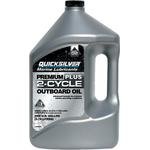Based on your informative post above, doesn't this make a good case for using fully synthetic lubricants where possible to utilize the benefit of a stable viscosity index for improved lubrication?
I can't think of a single case where non-synthetic oil would be more desirable than synthetic, if you only consider its lubricating properties... However, synthetic's price may sway your choice of a synthetic oil over a conventional dino oil.
It was my understanding the processing the oil undergoes to achieve a semi-synthetic or full synthetic oil classification makes the oil molecules more uniform, which sounds like what you stated.
Correct.
Bear in mind that you can achieve the same uniformity through a variety of means, including the fractional distillation techniques used with conventional dino oil... With conventional dino oil, and fractional distillation, you are essentially sorting out the different molecules, and selecting out only the type you want... you may not get the volume of a particular molecule that you need, and you certainly will get too much of the types you don't.
Synthetic oil processing takes the random dino oil soup, that comes from the well, and breaks it all down into a series of smaller molecules that can be recombined to build the molecule you desire. You are trading a more sophisticated production process for a return of nearly 100% of the oil molecule you desire.... in other words, no waste.
My only concern is the mixing of various additives that might be different between manufacturers that might cause some unknown issue. I'm not a chemist or chem. engineer by any stretch of the imagination, but was involved in a small project where I had to learn more abut this subject. (which is just about exhausted in this post.) And, based on the adjacent post from OL AG '89, I wonder if this might be one way to prevent what I'll call cross-contamination?
Most synthetic oil doesn't need, and as such doesn't contain, the viscosity modifiers that you find in conventional dinosaur multi-viscosity oils. It does, however, contain all of the other additives (detergents, friction modifiers, ...) that conventional dinosaur oils contain. They shouldn't produce a compatibility problem.
-Chuck






 I add a 12 oz bottle of 2 stroke with every fill up.
I add a 12 oz bottle of 2 stroke with every fill up.